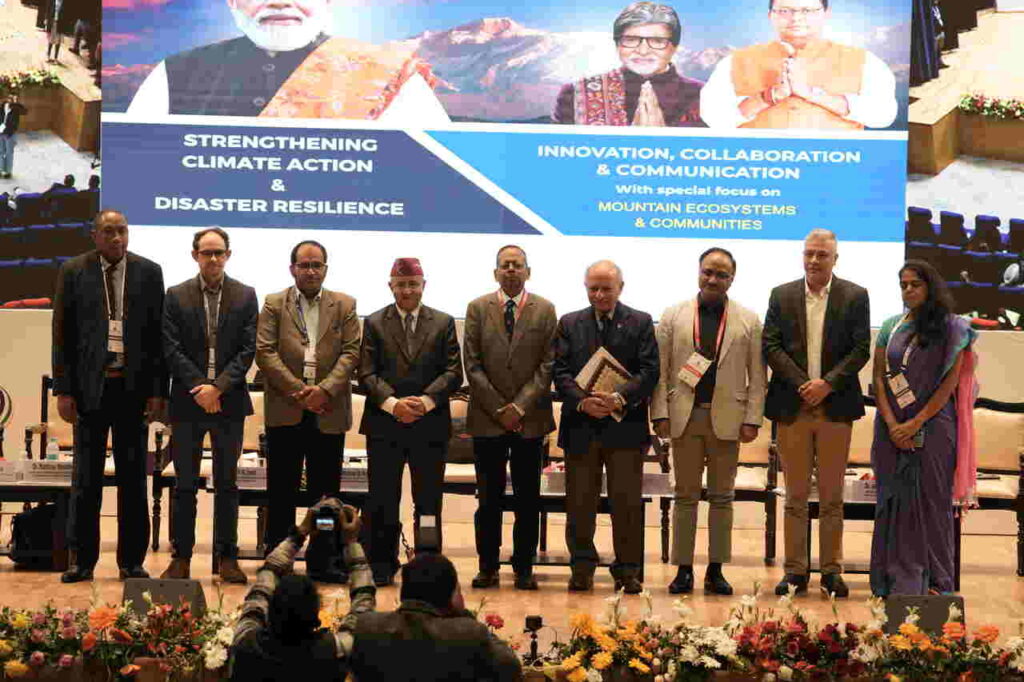Uttarakhand: On the second day of the four-day Disaster Management World Conference, scientists and experts brainstormed on various aspects of disaster management.

Eco-Disaster and Risk Reduction was discussed in the first session of the second day of the 6th World Disaster Management Conference, one of the largest global conferences on disaster management, in the second session. ” was held on National and Global Public Health Emergencies and Disaster Response, in which people discussed how to restore emergency health care facilities in times of disaster. Technical sessions were also held in today’s international conference, under which issues like Space Based Information for Disaster Management, Building Resilience of Communities through Ecosystem Based Approach, Marine Disaster Management, Inland Water Resources Impact on Environment – Building Economy Fox were discussed. .
The first session was chaired by Dr. Madhav B. Karki (Former Advisor to Prime Minister Nepal, and Member EPPCCMN Nepal). In his address, he expressed concern over the rising temperatures and through eco-disaster and risk reduction, future disasters can be solved by understanding them more closely. In his address, co-chairman of the panel discussion, Dr. N. Ravi Shankar (Former Chief Secretary, Uttarakhand and Vice Chancellor, DIT University, Dehradun) highlighted the coordination of man and machine and the needs of each other and innovation. He said that in times of disaster, But man’s main ally is the machine.
In his address, the main speaker of the first session, Ravi Singh (Secretary General and CEO WWF India) said that the situation of disasters in mountain region and coastal region is different in the disaster management plan. He told how At the time of disaster, the entire ecosystem changes and we can see that along with human life, animals, insects, aquatic life all get disturbed due to change in the ecosystem. He said that we want that all the people in the world The organization is working on the environment, all of them should come together and make a collective effort and talk about sustainable development and draw definite conclusions for it. While talking about knowledge and capacity building, he said that about disaster and environmental issues. People should have enough information so that they can think about what kind of action to take at the time of disaster and take action on it.
Other panelists at the event, Dr Matthew Westoby (Associate Professor Physical Geography, School of Geography, Earth and Environmental Sciences, Faculty of Science and Engineering, University of Plymouth, UK) in his address said that both our life and nature in high altitude and mountain regions Live together, we should keep the entire ecosystem sustainable by maintaining a balance between them. He talked about the changes due to Kedarnath tragedy, flood in Alaknanda river, he said that there has been a lot of change in the rivers originating from the Himalayan region and Whenever there is a disaster or flash flood, there is some change in these rivers which can be very dangerous for the future. He also talked about hydro power project and said that many times hydro power project affects the ecosystem. It both improves and also deteriorates.
Other panelists included Dr. Priya Narayan (Senior Manager, Urban Development, WRI, India) in her address spoke on the impact of climate change in India and said that environmental change is not a matter of any particular state, it is now all about Climate change is visible across India. He spoke about the “Kavaki Initiative” which is being run in Kerala where many such campaigns have been launched to maintain environmental balance in which efforts are being made to maintain harmony between the hills, plains and coastal areas.
Panelist Dr. Haman Unusa (Unit Head for Studies and Prospection, GEF Operational Focal Point, Cameroon) in his address said that the impact of climate change and disaster is on agricultural land the most and now this issue of agricultural land is a matter of concern to the world. It has become a matter of concern for. In his suggestion, he talked about preventing soil erosion by planting bamboo on the banks of rivers and he said that through bamboo we can control the flow of the rivers and at the same time we can also stop the soil from flowing in the rivers. . He further said that bamboo grows in a group and grows on the banks of rivers in the form of small dams. Planting bamboo will also help people economically because many products are made from bamboo which people use for themselves.
Panelist Kritiman Awasthi (Senior Advisor and Team Leader Wetland Management Biodiversity and Climate Protection, Indo-German Biodiversity Programme, GIZ India) in his address talked about the Indo-German Biodiversity Program and said that capacity building and training of people even at the Panchayat level. There is a need for sustainable development, which can reduce the risk of disaster whenever disaster strikes. Capacity building and training of people will help in maintaining your ecosystem and people will be able to handle themselves whenever disaster strikes. Dr. Harish said Bahuguna, Deputy Director General, Geological Survey of India, spoke about landslides and the dangers they pose. He said that when a natural disaster occurs, it does not just happen on one side, it affects the entire ecosystem and causes a lot of invisible damage. The damage that is not visible to us becomes visible only after the change in the ecosystem. Dr. Shalini Dhyani expressed her views through video conference and said that we can see the impact of climate change in the hilly areas. The impact is happening very fast, it is only after studying the ecosystem and biodiversity that it is known how much damage it is causing! We can see that many types of animals in the mountains are on the verge of extinction, the only reason for this is change in the environment.
The second session of the program was on “National and Global Public Health Emergencies and Disaster Response”, in which people discussed how to restore emergency health care facilities in times of disaster. The main panelists present in this panel discussion included Vinod Chandra Menon, Founder Member, National Disaster Management Authority, Government of India and Regional Director Asia Times, Oslo, Norway, Professor. Hemchand Vice Chancellor, HNB Uttarakhand Medical Education University, Dehradun, Major General Professor Atul Kotwal, SM, VSM, Dr. Chris Brown, Director, Division of Emergency Operations, Office of Readiness and Response US, Center for Disease Control and Prevention, USA , Dr. Saurabh Goyal, Join Director IDSP, NCDC, MOHFW etc. were present.
Technical sessions have also been organized in this international conference under which issues like Space Based Information for Disaster Management, Building Resilience of Communities through Ecosystem Based Approach, Marine Disaster Management, Inland Water Resources Impact on Environment – Building Economy Fox were brainstormed.
While talking to the media in this international conference, Professor PK Joshi (School of Environmental Science, Special Center for Disaster Research, Jawaharlal Nehru University, New Delhi) says that such an international event is the first to understand the issue seriously and at the global level. But let us get information about what issues are going on in this context! The discussion that is happening here is happening at the international level and this is not just India’s problem, it is a whole global issue which we are discussing here. are doing.






